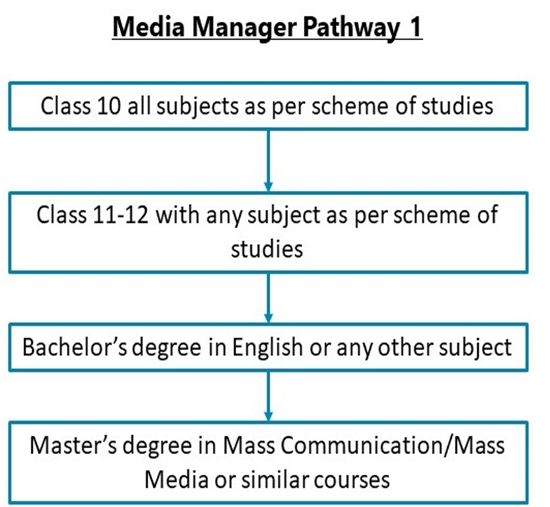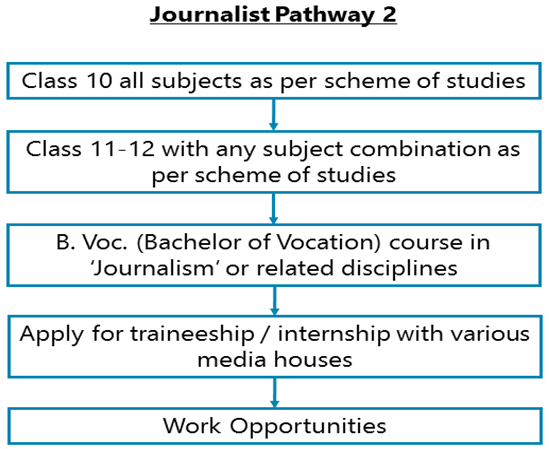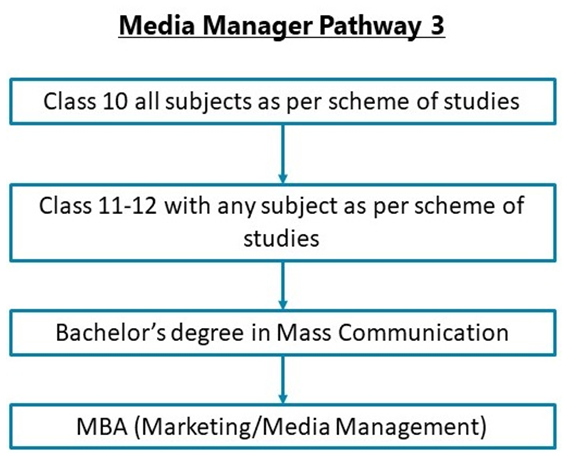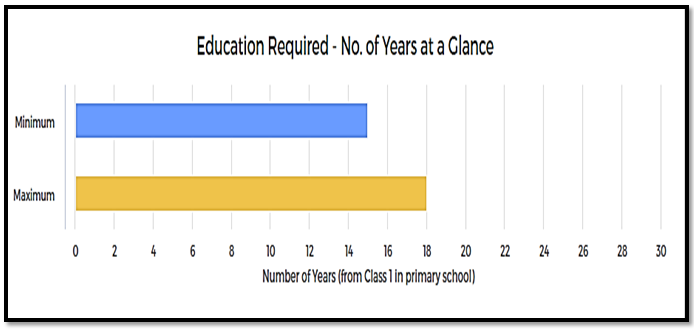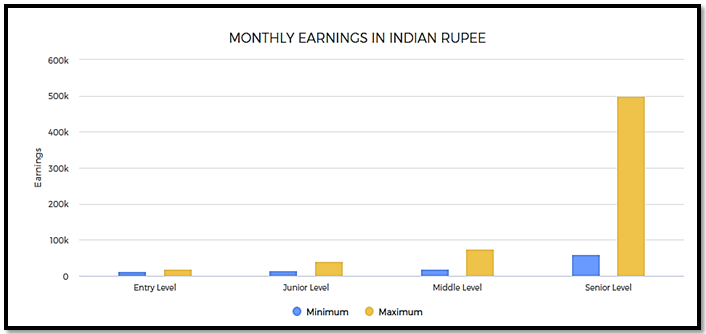Media Manager
Entry Level Qualification
Graduate
Career Fields
Mass Media, Journalism & Entertainment
For Specially Abled




Career Entrance Exam
CAT, MAT, TANCET MBA, KEAM
About Career
1. As a Media Manager, you will administer and manage the entire management as well as the organizational infrastructure of media enterprises. Your responsibility will be to handle a host of tasks and functions pertaining to organizational management, production management, strategic management, procurement management, and of course, marketing and promotion of the media enterprise you represent.
2. You will be involved both in the direct and indirect distribution of media focusing on all kinds of media marketing platforms like television, radio, newspapers, magazines, and films, among other things. Your primary aim will be to develop strategies and plans to advertise services/products through mediums like the television and radio broadcasts in order to gain the attention of the viewers/listeners. You may also simultaneously use online mediums to advertise/promote/market products or services.
PARTICULARS | DESCRIPTION |
Name | Media Manager, |
Purpose | Oversee Content Creation, Distribution & Many More |
Career Field | Mass Media, Journalism & Entertainment |
Required Entrance Exam | No Entrance Exam |
Average Salary | 200000 - 400000 Rs. Per Year |
Companies For You | Management Trainee, Associate Manager, Assistant Manager & Many More |
Who is Eligible | Class 12th Pass |
Key Roles And Responsibilities:
1. To contact existing clients to determine and arrange the position and design of advertisements that have been agreed upon.
2. To explain media advertising costs to potential clients and arrange the fee and terms and conditions accordingly.
3. To collaborate with production teams to ensure that all the agreed advertisements are being carried out according to the client’s instructions.
4. To attend industry events, exhibitions, and conferences, etc., and meet both potential and existing clients.
5. To maintain an accurate record of sales, costs, and contracts.
6. To review completed scripts/program or advertisement ideas and plan the initial schedules and budget estimates.
7. To determine what resources needed for the program/advertisement, including location, studio facilities, actors, crew members, props, necessary equipment, etc.
8. To recruit crews, contractors, vendors, etc.
9. To secure funding for the planned programs and also arrange all the necessary resources.
10. To organize business, finance, and employment issues associated with the entire production process.
11. To determine how the production budget will be spent.
12. To ensure that everything runs smoothly during filming and production.
13. To meet the senior production staff to discuss scripts/program ideas.
14. To negotiate the costs of booking venue, equipment, and other resources with suppliers/vendors.
15. To arrange for any permissions necessary for filming.
16. To handle the entire production team including actors/cast members, scriptwriters, directors, spot boys, and other crew members.
17. To secure insurance and ensure that health and safety rules and copyright laws are followed.
18. To resolve any kind of workplace issues will skill and tact.
Career Entry Pathway
Class 10 all subjects as per scheme of studies - Class 11-12 with any subject as per scheme of studies - Bachelor’s degree in English or any other subject - Master’s degree in Mass Communication/Mass Media or similar courses.
After completing your Class 10 all subjects as per scheme of studies, you can complete Class 11-12 with any subject as per scheme of studies. Then, you can pursue your graduation with a Bachelor’s degree in English or any other subject and follow it up with a Master’s degree in Mass Communication/Mass Media or any other such similar media marketing/management courses.
Class 10 all subjects as per scheme of studies - Class 11-12 English along with any subject as per scheme of studies - Bachelor’s degree in Mass Communication/Mass Media - Master’s degree Mass Communication/Mass Media or similar courses.
After completing your Class 10 all subjects as per scheme of studies, you can complete Class 11-12 English along with any subject as per scheme of studies. Then, you can pursue your graduation with a Bachelor’s degree in Mass Communication/Mass Media and follow it up with a Master’s degree in Mass Communication/Mass Media or any other such similar media marketing/management courses.
Class 10 all subjects as per scheme of studies - Class 11-12 with any subject as per scheme of studies - Bachelor’s degree in Mass Communication - MBA (Marketing/Media Management).
After completing your Class 10 all subjects as per scheme of studies, you can complete Class 11-12 with any subject as per scheme of studies. Then, you can pursue your graduation with a Bachelor’s degree in Mass Communication, followed by an MBA with a specialization in Marketing or Media Management.
Required Qualification & Competencies
Undergraduate studies after school
You can complete your graduation with a Bachelor’s degree in English/Mass Communication/Mass Media, or any other subject or media marketing/management courses available in the country.
Post Graduate studies
For postgraduate level studies in this field, you can choose to study Mass Communication / Mass Media or any other such similar media marketing/management courses. You can also opt for an MBA with a specialization in Marketing or Media Management.
MINIMUM EDUCATION REQUIRED | MAXIMUM EDUCATION REQUIRED |
Under Graduate Undergraduate Degree / Honours Diploma / Graduate Diploma (equivalent to a Degree) Programs for which the minimum eligibility is a pass in Higher Secondary / Class XII School Leaving examination. | Post Graduate Postgraduate Degree / Diploma / Certificate Programs for which the minimum eligibility is a pass in Graduation / equivalent Diploma program like Honours Diploma or Graduate Diploma. |
Competencies Required
1. Enterprising: You should have interests for Enterprising Occupations. Enterprising occupations involve taking initiatives, initiating actions, and planning to achieve goals, often business goals. These involve gathering resources and leading people to get things done. These require decision making, risk-taking, and action orientation.
2. Conventional: You should have interests for Conventional Occupations. Conventional occupations involve repetitive and routine tasks as well as fixed processes or procedures for getting things done. These occupations involve working more with data, systems, and procedures and less with ideas or creativity.
Personality traits
1. You are always or mostly organized in your day-to-day life and activities.
2. You are always calm or generally remain calm in most situations.
3. You can always act independently or could do so in most situations.
4. You always prefer to experience new things and have new experiences or you mostly do.
5. You are always friendly and outgoing; you love to be in the company of people always or most of the times.
Skills
1. Active Listening: Giving full attention to what other people are saying, understanding the points being made by others, asking questions, etc.
2. Critical Thinking: Skills in the analysis of complex situations, using logic and reasoning to understand the situations and take appropriate actions or make interpretations and inferences.
3. Coordination: Skills in working together with other people to get things done.
4. Problem Solving: Skills in analysis and understanding of problems, evaluating various options to solve the problems and using the best option to solve the problems.
5. Persuasion: Skills in persuading others to change their minds or behavior.
6. Managing Human Resources: Skills in motivating, developing, and leading people as they work, identifying the best people for the job.
7. Time Management: Skills in prioritizing work, managing time effectively.
Knowledge
1. Sales and Promotion: Knowledge of the various principles, theories, methods, systems and processes to communicate and promote the benefits of various products or services of an organization to a targeted group of customers, influencing their buying decisions and convincing them to buy the products or services.
2. English Language: Knowledge about English grammar, words, spelling, sentence construction, using English to communicate with others, reading in English, etc.
3. Communications and Media: Knowledge of how different media such as print, television, radio, and social media works; how to produce content such as news, articles, audio-visual programs, etc. for different media. This includes various ways to inform and entertain people via print, audio, audio-visual and online media.
4. Administration: Knowledge of various administrative and operational functions in managing a business or an organization such as general administration, facility management, front office management, back office management, etc.
5. Marketing: Knowledge of the various principles, theories, methods, systems, and processes to understand the needs of a category of customers and then creating, communicating, and delivering various products and services in order to satisfy the needs of the customers.
Career - Job Opportunities & Profiles
You can begin your career in this field by bagging internships in AV media companies or Radio channels, or you could get entry-level roles like that of a Production Trainee / Management Trainee / Associate Manager / Assistant Manager, etc.
Work Environment
Media Managers usually spend a large part of their time indoors, whether it be in the office, production sets, or radio station studios. They work around 10-12 hours every day and sometimes, even more, depending upon deadlines and the requirements of the projects at hand. They also have to travel from time to time to meet up with potential sponsors, celebrities, vendors, etc.
Specialisation Tracks In This Career
1. Media Marketing
Media Marketing Managers of AV companies focus on selling commercial spots (10 seconds/20 seconds/30 seconds advert spots), in-program product placement positions, and sponsorship opportunities to potential sponsors and also in radio channels with promotions including commercial audio clips and RJ mentions. Media Marketing Managers are required to meet with potential sponsors and agencies who would be willing to advertise through traditional commercials and in-program product placement in TV shows. They also need to approach TV/radio personalities for endorsement deals.
2. Media Operations Manager (Producer)
Media operation tasks are almost exclusively related to AV media wherein the Media Operations professionals basically take on the role of a Producer (of entertainment shows, news hour telecasts, game shows, and other shows that are broadcasted through AV media channels). Media Operations professionals include Production Trainees, Assistant Producers, and Executive Producers who together handle and manage the entire production and post-production process and ensure that all the stakeholders involved (scriptwriter, casting director, technical crew members, cast, set designers, etc.) are functioning efficiently. They act as a communication link between all the stakeholders involved in the production of a show/commercial.
Career Growth
1. If you are in the Media Marketing field, you will generally start off as a Trainee Manager/Management Trainee/ or Sales Executive/Manager, or Business Development Manager. After you’ve gained around 6-10 years of industry experience, you can upgrade to senior-level roles like Senior Business Development Manager, Head of Sales, Channel Sales Manager, etc. And after gaining more experience in your job, you can further upgrade to roles such as Associate Vice President (Sales/Marketing or Sales and Marketing), Vice President (Sales/Marketing or Sales and Marketing), etc.
2. If you are in the Media Operations field, you will begin your career as a Production Trainee and within 3-5 years, you can upgrade to the level of Assistant Producer. Then after 8-12 years of experience, you can become an Executive Producer. After 15-20 years of experience, you may get into the position of Channel Producer and Executive Director, who is the head of the production of an AV channel.
Salary Offered
1. In entry-level jobs, you can expect a monthly salary package of around Rs. 16,000 - 25,000.
2 .As you gain about 6-10 years of experience and move on to mid-level roles in the field, your average monthly salary will be somewhere around Rs. 28,000 - 45,000.
3 .For senior-level job positions (with 12-20 years of experience), the salary package is much higher and ranges anywhere between Rs. 40,000 - 80,000 or more per month.
Monthly Earning In Indian Rupee
Entry Level | Junior Level | Mid Level | Senior Level | |||||
Min Earning | Max Earning | Min Earning | Max Earning | Min Earning | Max Earning | Min Earning | Max Earning | |
15000 | 25000 | 25000 | 60000 | 35000 | 200000 | 60000 | 500000 | |
1. Entry level: 0 - 2 years of work experience
2. Junior Level: From 1 to 12 years of work experience
3. Mid Level: From 5 to 20+ years of work experience
4. Senior Level: From 10 to 25+ years of work experience (there could be exceptions in some high-end technical, financial, engineering, creative, management, sports, and other careers; also in the near future, people will reach these levels much faster in many careers and in some careers, these levels will have no meaning as those careers will be completely tech skill driven such as even now, there is almost no level in a Cyber Security Expert’s job)
Work Activities
1. Communicating with co-workers and others: Communicating with people in writing, verbally or otherwise inside your workplace and various other people who have professional relationships with your place of work including vendors, government officials, etc. or with people at large.
2. Creative thinking: Developing new ideas, concepts, innovative solutions to problems, newer ways of getting things done, designing products and services, creating work of art and craft, etc.
3. Organizing, planning and prioritizing tasks: Planning and organizing tasks in order to achieve work goals; prioritizing tasks to achieve goals and making the best use of the time available.
4. Decision making and problem-solving: Analysis of data and information; evaluation of alternative decisions and results of decisions; taking the right decisions and solving problems.
5. Negotiating: Negotiating terms, conditions, costs, prices and other issues.
6. Selling: Communicating about products and services with potential customers; influencing customers' decisions to buy products and services; helping people to buy products and services.
7. Scheduling tasks: Scheduling project timelines, tasks and activities.
8. Developing and maintaining interpersonal relationships: Developing professional relationships with co-workers and others outside organizations and maintaining good relationships.
9. Using computers for work: Using computers for day-to-day office work; using computer software for various applications in day-to-day professional work; entering data and process information; for writing.
Future Prospects
According to the latest IBEF (India Brand Equity Foundation) stats, the Indian Media and Entertainment (M&E) industry is expanding and growing quite rapidly, thanks to rising consumer demand and improved advertising revenues. It further maintains that the Indian advertising industry is estimated to be the second fastest-growing advertising market in Asia after China. Also, the M&E industry provides employment to nearly 3.5-4 million people.The Indian M&E industry is projected to grow at a CAGR of 13.10%, reaching US$ 39.68 billion. These stats show that employment opportunities in this sector will continue to grow in the future.
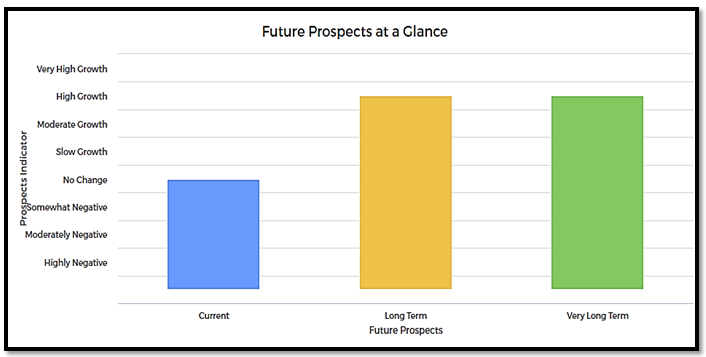
Future Prospects At A Glance
Current (0-1 year) | Long Term (2-5 year) | Very Long Term (6-10 years) |
No Change | High Growth | High Growth |

